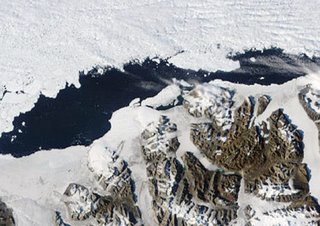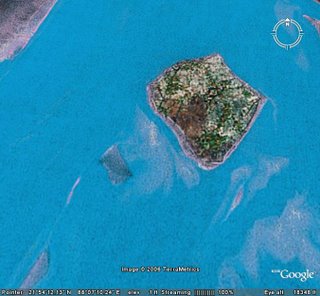
Canada now has a new floating island of ice, shown here breaking off from Ellesmere Island on August 13, 2005 ...

... while in India's Bay of Bengal an island has disappeared under the waves (It's now a smudge just below the island in photo), as blogged here recently.
Scientists reported today that the Ayles Ice Shelf, one of only six major ice shelves left in the Canadian Arctic, collapsed from the coast of Ellesmere Island into the sea. And it wasn't the first.

In 2002, the Arctic's largest ice shelf -- the Ward Hunt Ice Shelf -- broke up.
Is this news? It shouldn't be. In 2002, a paper published by the U.S. Geological Survey concluded by saying:
"The ice shelves [along the north coast of Ellesmere Island] were once much more extensive than they are today ... and it is reasonable to suppose that the disintegration of the Ellesmere Ice Shelf was a response to the pronounced warming during the last century ... It is difficult to ignore the connection between the state of the Ellesmere Island ice shelves, the state of the climate, and changes taking place elsewhere in the Arctic Basin. The ice shelves are bellwethers of climate change."As a New Years resolution for 2007, we should wish all these ostrich-like politicians and skeptics to pull their heads out from the ice and see the bi-polar changes that global warming has already brought. Not to mention what's coming.
Categories: GlobalWarming, Canada, India









